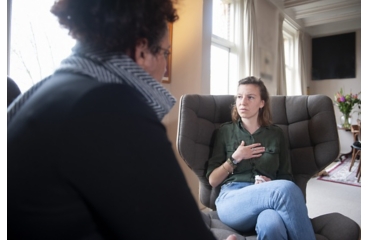
Your Care Instructions
Depression is a condition that affects the way you feel, think, and act. It causes symptoms such as low energy, loss of interest in daily activities, and sadness or grouchiness that goes on for a long time. Depression is very common and affects men and women of all ages.
Depression is a medical illness caused by changes in the natural chemicals in your brain. It is not a character flaw, and it does not mean that you are a bad or weak person. It does not mean that you are going crazy.
It is important to know that depression can be treated. Medicines, counseling, and self-care can all help. Many people do not get help because they are embarrassed or think that they will get over the depression on their own. But some people do not get better without treatment.
Follow-up care is a key part of your treatment and safety. Be sure to make and go to all appointments, and call your doctor if you are having problems. It's also a good idea to know your test results and keep a list of the medicines you take.
How can you care for yourself at home?
Learn about antidepressant medicines
Antidepressant medicines can improve or end the symptoms of depression. You may need to take the medicine for at least 6 months, and often longer. Keep taking your medicine even if you feel better. If you stop taking it too soon, your symptoms may come back or get worse.
You may start to feel better within 1 to 3 weeks of taking antidepressant medicine. But it can take as many as 6 to 8 weeks to see more improvement. Talk to your doctor if you have problems with your medicine or if you do not notice any improvement after 3 weeks.
Antidepressants can make you feel tired, dizzy, or nervous. Some people have dry mouth, constipation, headaches, sexual problems, an upset stomach, or diarrhea. Many of these side effects are mild and go away on their own after you take the medicine for a few weeks. Some may last longer. Talk to your doctor if side effects bother you too much. You might be able to try a different medicine. If you are pregnant or breastfeeding, talk to your doctor about what medicines you can take.
Learn about counseling
In many cases, counseling can work as well as medicines to treat mild to moderate depression. Counseling is done by licensed mental health providers, such as psychologists, social workers, and some types of nurses. It can be done in one-on-one sessions or in a group setting. Many people find group sessions helpful.
Cognitive behavioral therapy is a type of counseling. In this treatment, you learn how to see and change unhelpful thinking styles that may be adding to your depression. Counseling and medicines often work well when used together.
When should you call for help?
Call 911 anytime you think you may need emergency care. For example, call if:
- You feel you cannot stop from hurting yourself or someone else.
Where to get help 24 hours a day, 7 days a week
If you or someone you know talks about suicide, self-harm, a mental health crisis, a substance use crisis, or any other kind of emotional distress, get help right away. You can:
- Call the Suicide and Crisis Lifeline at 988.
- Call 1-800-273-TALK (1-800-273-8255).
- Text HOME to 741741 to access the Crisis Text Line.
Consider saving these numbers in your phone.
Go to 988lifeline.org for more information or to chat online.
Call your doctor now or seek immediate medical care if:
- You hear voices.
- You feel much more depressed.
Watch closely for changes in your health, and be sure to contact your doctor if:
- You are having problems with your depression medicine.
- You are not getting better as expected.
Where can you learn more?
Go to http://www.healthwise.net/patientEd
Enter G693 in the search box to learn more about "Depression Treatment: Care Instructions".
Current as of: July 31, 2024
Author: Ignite Healthwise, LLC Staff
Clinical Review Board
All Healthwise education is reviewed by a team that includes physicians, nurses, advanced practitioners, registered dieticians, and other healthcare professionals.

